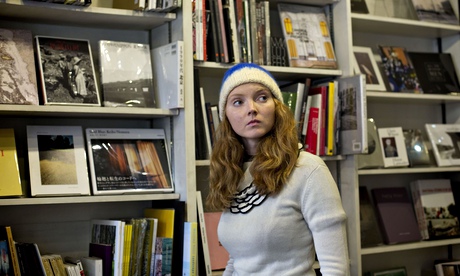Booksellers Association calls in celebrity support for Books Are My Bag campaign after more than 500 closures since 2005
Sarah Butler
The Guardian, Friday 21 February 2014 18.25 GMT
The number of independent bookshops gracing British high streets has fallen below 1,000 – a third fewer than nine years ago, amid cut-throat competition from supermarkets, Amazon and ebooks.
Booksellers warned that the health of the publishing industry was at risk as new figures revealed more than 500 independent outlets have shut since 2005.
With the additional pressures of rising costs and the economic downturn that face all small retailers, 67 local bookshops closed last year, according to the Booksellers Association, while just 26 opened, leaving 987 still trading.
“Everyone should sit up and take notice of this,” said Tim Godfray, chief executive of the association. “The book trade, the government and the general public need to realise that if we don’t take action now, the future of our bookshops – and therefore the health of the publishing industry and reading itself – is at risk.”
Children’s specialist the Lion & Unicorn bookshop in Richmond, south-west London, the Dover Bookshop in Covent Garden and Hale Bookshop in Cheshire were among last year’s casualties. Meanwhile, independent booksellers said that difficulties in getting finance were putting off new shop owners.
The association has called in celebrities including former model Lily Cole, celebrity chef Rachel Khoo and TV presenter Dawn O’Porter, to help muster support for independent bookshops under the Books Are My Bag campaign.
Cole, who co-owns the Claire de Rouen bookshop on Charing Cross Road, London, said: “It’s great that there are so many ways now to consume literature but the independent bookshop is a crucial part of our culture and I would hate to see them disappear from our towns and cities.”
Morag Watkins, co-owner of Chorleywood Bookstore in Hertfordshire, said bookshops faced the same problems as many other independent retailers, from rising rents and business rates to parking charges. But she added: “We face the extra challenge from digital and the big online retailers.”
While independent stores are facing the most serious problems, booksellers in general are suffering as the number of printed books sold dropped by 9.8% last year to 184m, according to analysts at Nielsen BookScan. The fall was partly due to a slowdown in sales of EL James’s racy Fifty Shades trilogy, which at the peak of their popularity accounted for almost half of all novels sold. But physical book sales are also being hit by the switch to digital, with separate figures indicating ebook sales rose 134% in 2012 to represent more than 7% of book publishers’ total sales.
In the face of changing habits even Waterstones, the UK’s biggest bookstore chain, has shrunk from about 300 to 280 stores in the past few years as it has battled to return to profitability.
However, there is hope that the dramatic changes may have largely run their course. James Daunt, who owns the independent Daunt Books chain and runs Waterstones, said that in the US, where ebooks appeared earlier than in the UK, sales of digital books appear to have reached a plateau, while Amazon is seeing slower growth in book sales.
After a reasonable Christmas, Waterstones is opening new stores again this year, with up to a dozen planned.
“Perhaps the worst is over,” Daunt said. “But bookshops still have to be very good to justify themselves these days. It’s not an easy trade but if you can earn the respect of your customer you will do fine.”
He said bookshops were learning to survive by opening cafes and offering new ideas such as subscription services in which readers are regularly sent books to suit their interests and tastes. “Bookshops are evolving into something that goes beyond books and that’s quite exciting,” he said.
Watkins said Chorleywood was thriving despite the tough market because it put on lots of events and festivals with authors and celebrities from Terry Wogan to Bill Bryson and Jo Baker, the author of Longbourn. “Bookshops have to get out into their communities and take books to the people because people are not going to come to them,” she said. But Daunt cautioned: “Nobody gets rich selling books, you do it because you love it.”
Success story
Nic Bottomley joined the thinning ranks of independent booksellers in 2006 when he quit his job as a derivatives lawyer to set up Mr B’s Emporium of Reading Delights in Bath. Sales have risen every year despite the downturn but he acknowledges many of his peers are struggling. He says fellow independent bookstores face a tough challenge, including rising business rates and the growing power of Amazon.
“We can try and be atmospheric and quirky because we are in a decent sized city with a lot of tourism. Trying to be a straight-up, independent bookshop in a market town anywhere is going to be difficult because you’re going to be stocking a very general range of the type of book which is heavily discounted online. That’s a bigger problem than ebooks or chains like Waterstones.”
Mr B’s sells books online but that is just a tiny part of the business. The best customers like browsing in the store. However, the shop also tempts with new ideas such as a “reading spa” where bookworms can enjoy a one-on-one consultation in the “bibliotherapy room”. There, they are introduced to a pile of new books selected to meet their taste over tea and cake.
The shop has also extended its reach far and wide with its “Reading Year” service in which it sends out a book picked to meet an individual’s taste every month. “We have many subscribers all over the world and it’s a major part of our business,” says Bottomley.
See online: Independent bookshops in decline as buying habits change

